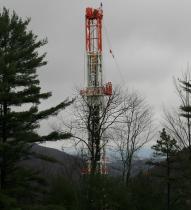Analysis of Marcellus Shale natural-gas legislation offered in webinar
http://live.psu.edu/story/50593#nw69
Friday, January 7, 2011
Analysis of Marcellus Shale natural-gas legislation offered in webinar
 University Park, Pa. — An online seminar offered by Penn State Cooperative Extension at 1 p.m. on Jan. 20 will provide expert analysis of state legislation enacted and considered related to the exploration and production of natural gas in the Marcellus Shale formation.
University Park, Pa. — An online seminar offered by Penn State Cooperative Extension at 1 p.m. on Jan. 20 will provide expert analysis of state legislation enacted and considered related to the exploration and production of natural gas in the Marcellus Shale formation.
Although the General Assembly was active during the 2009-10 legislative session in discussing and considering legislation, many issues remain unresolved regarding development of the Marcellus Shale, according to Ross Pifer, clinical professor and director of the Agricultural Law Resource and Reference Center at Penn State. The center is a collaboration between the University’s Dickinson School of Law and College of Agricultural Sciences.
In the webinar, titled “Marcellus Shale Legislation: What Was Accomplished in the 2009-10 Session and What Issues Remain to be Addressed,” Pifer will review the legislative session that ended Dec. 31 and preview the current session.
“I will discuss the details of natural-gas legislation enacted during the most recent legislative session as well as the various topics that were the subject of legislation introduced in, but not enacted by, the General Assembly,” he said. “I will then look forward to the legislative session that has just begun and discuss issues that are likely to be the subject of further legislative debate.”
In the 2009-10 session, legislation was enacted to provide for greater public accessibility to production data from Marcellus Shale wells. Legislation also was enacted to address the impact of natural-gas development on land that is enrolled in the Clean and Green preferential tax-assessment program.
“Through this legislation, counties across the state will be addressing this issue in a uniform fashion,” Pifer said. “Prior to the enactment of this legislation, counties across the commonwealth were treating this issue in a disparate manner.”
The topic that received the most attention throughout the conclusion of the last legislative session was whether or not Pennsylvania would implement a severance tax on natural gas. Ultimately, the General Assembly did not enact legislation providing for this tax, but the subject may be revisited.
“One issue that likely will be discussed in the new session is compulsory pooling,” Pifer said. “This has been a controversial topic as many landowners are concerned about the impact that such a law would have on their property rights. On the other hand, the state has a legitimate policy interest in ensuring that development occurs as efficiently as possible.”
The webinar is part of an ongoing series of workshops and events addressing issues related to the state’s Marcellus Shale gas boom. Information about how to register for the webinar is available on the webinar page of Penn State Cooperative Extension’s natural-gas impacts website.
Additional one-hour webinars will be held at 1 p.m. on the following dates:
— Feb. 16: “Dealing with Gas Tax Issues: What You Need to Know.”
— March 17: “Natural Gas Well Development and Emergency Response and Management.”
Previous webinars, publications and other information on topics such as water use and quality, zoning, gas-leasing considerations for landowners and implications for local communities also are available on the Cooperative Extension natural-gas impacts website.
For more information, contact John Turack, extension educator in Westmoreland County, at 724-837-1402 or jdt15@psu.edu.
